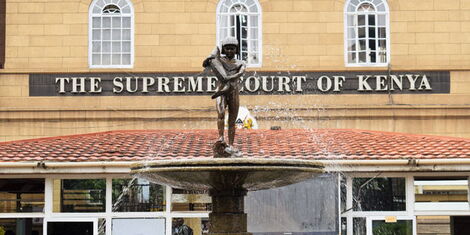Senior Counsel Ahmednasir Abdullahi has been issued a stern warning by Supreme Court Judges for allegedly continuously disrespecting the Apex Court.
The trial of Sayed Nasrollah Ibrahim and Abdolhosein Gholi, two Iranians charged with terrorism, was filled with anxiety as tension loomed.
The Senior Counsel was not present in court when the judges delivered a 29-minute ruling addressing “his unbecoming behavior”.
Reading the ruling on behalf of the other judges, Justice Jackton Ojwang’ warned that if he (Ahmednasir) repeated the same, he would get five days in jail or a Ksh500,000 fine for contempt.

The judge stated that the lawyer ought to have argued his clients’ case without casting aspersions.
While reading the riot act to the lawyer in his absence the Justice Ojwang’ warned Ahmednasir about being discourteous to the court.
“Abdullahi was more than discourteous to this court. Weightful insults directed at a judge during trial is prohibited in all civilized legal process. The purpose of this ruling is limited to depicting the face of grumpy and ill-tempered behavior before the Supreme Court.
“It baffles the mind how Abdullahi, an advocate of the High Court and leading member of the Law Society of Kenya, seeking justice for his clients would address this court on such terms,” stated Justice Ojwang.

Ahmednasir, in his submissions, Justices David Maraga, Mohammed Ibrahim, Ojwang’, Njoki Ndungu, Isaac Lenaola, and Smokin Wanjala last year sensationally referred to the court as a “headless chicken,” a “surrogate of the State” and “incoherent.”
He held that the judges were biased against his clients and were a “jurisprudential train wreck and they churn out counterfeit decisions.”
The Judges went ahead to reverse the acquittal of the two Iranian citizens and upheld the 15-year jail term they had been handed by the high court.